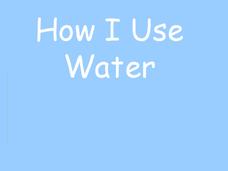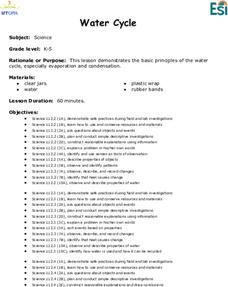Smarter Balanced
Effects of Water
To prepare for a performance task assessment, class members review the stages of the water cycle and then individuals assume the roles of drops of water for a Reader's Theater exercise. The script, a graphic depicting the water cycle,...
Curated OER
How I Use Water
Beginning with a brief anticipatory set on how water is commonly used, this presentation evolves into a well planned lesson on the water cycle. Students will discuss vocabulary, label the parts of the water cycle, locate where water is...
Curated OER
Water Cycle Reading and Writing
Here is a great way to get pupils to express a scientific concept in a fun way. After hearing the story of Walter the Water drop and learning facts about the water cycle, the class will write a creative expository piece describing what...
Curated OER
The Water Cycle
An inventive and interesting lesson plan on the water cycle (and other cycles associated with it), is here for you. After doing a well-designed hands-on inquiry in class, learners also identify organisms and processes that are involved...
Curated OER
I Just Drank George Washington's Water!
Guide your learners through the water cycle with this lesson plan. Over the course of the lesson, they read two Magic School Bus books, discuss the water cycle, come up with water facts, complete a diagram of the water cycle, recognize...
Graves County Schools
The Water (H2O) Cycle
Learners in elementary grades would love this colorful and informative presentation on the water cycle. Using pictures and diagrams, it makes the water cycle understandable. The bright colors the author chose for the slides should appeal...
Curated OER
Water Cycle Worksheets
A website links you to several water cycle worksheets geared toward an upper elementary or middle school level. Diagrams, word search, crossword, and fill-in-the-blank worksheets are available. As an added bonus, there are links to...
Alabama Learning Exchange
WATER You Doing to Help?
Auntie Litter is here to educate young scholars about water pollution and environmental stewardship! Although the 15-minute video clip is cheesy, it's an engaging look at the water cycle and conservation. Learners start by illustrating...
Curated OER
Exploring the Water Cycle
The water cycle is one of earth's most easily observable processes, but demonstrating each step within classroom walls can be a challenge. Through a series of videos and quick demonstrations, cover each aspect of the hydrologic cycle in...
Curated OER
Physical Changes and States of Matter - Two
Here's a wonderful lesson on how substances change states. Groups of learners are given trays with a chocolate bar, a piece of paper, an ice cube, and a balloon. During the activity, the groups closely observe the changes that each...
National Wildlife Federation
The Water Cycle
Observe the water cycle from the comfort of your classroom with this excellent earth science experiment. Working collaboratively, young scientists first create terrariums complete with hills, plants, lakes, and an atmosphere,...
American Chemical Society
The Water Cycle
Bring the water cycle into the classroom without the mess. Learners build a model of the water cycle using everyday materials. They observe the process of evaporation and condensation and relate their observations to the larger scale...
Curated OER
Water Cycle Song
Oh my! Get ready for a water cycle song. This short little song, sung to the tune of "Oh My Darling Clementine," is intended to assist young weather enthusiasts in recalling the three parts of the water cycle. Tip: Have your class group...
Science 4 Inquiry
States and Phases of Matter
Plasma is the most common phase of matter in our universe. Scholars explore the change of energy as molecules change phases of matter. They rotate through stations, graphing the changes in energy level.
Curated OER
The Water Cycle
Fifth graders review and discuss, "The Water Cycle" and its key elements of evaporation, condensation and precipitation. They create a terrarium in groups to connect concepts of The Water Cycle and to view precipitation, condensation,...
Curated OER
Water Cycle in a Bag
Middle schoolers participate in a hands-on activity that demonstrates how the water cycle functions. Students look specifically at condensation and evaporation during the recycling of water.
Curated OER
Air and Water in the Environment
Students explore the traits of water condensation and evaporation. In this water cycle lesson, students develop an awareness of the importance of water for sustaining life. Students participate in a hands-on activity in which water is...
Curated OER
The Water Cycle (Online Interactive Worksheet)
In this water cycle worksheet, students learn about evaporation, condensation and precipitation by reading a text. Students then answer 12 multiple choice questions. This is an online interactive worksheet.
Curated OER
Rain, Rain, Go Away
Students conduct a number of experiments involving evaporation and condensation. They view and discuss a video about the water cycle and then design posters about the rain based on the book "Cloudy With A Chance of Meatballs".
Curated OER
The Atmosphere and Flight
Students investigate evaporation and condensation, and apply the concepts to understanding cloud formation.
Curated OER
Watercycle
Third graders examine the natural circulation of water from oceans, lakes, and rivers to evaporation into the air, and then to condensation to produce rain falling back to the soil as components of the water cycle.
Curated OER
Physical Changes and States of Matter
Fourth graders study evaporation and condensation as parts of the water cycle. First they determine the similarities and differences between a cup of water and an ice cube before measuring the volume of ice before melting it, and...
Curated OER
Moist Air & Clouds
Fifth graders study the weather and water cycle of clouds. In this water cycle lesson, 5th graders read background information about evaporation, condensation, and the states of water.
Curated OER
Water Cycle
Students perform experiments with water to observe the principles of evaporation and condensation. They make models of the water cycle and discuss the processes that occurred in their experiments with their jars of water.

























